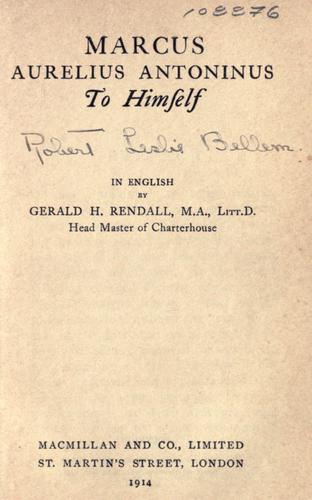Stephanie Jane recenzis Meditations de Marcus Aurelius
Insightful and still very relevant
5 steloj
Marcus Aurelius is a name I've often encountered - his words quoted at the beginning of novels or mentioned in passing by 'intellectual' characters - so, on spotting this reissued translation of his Meditations on NetGalley, I couldn't help but to request the book. Unsurprisingly for a work that's over eighteen centuries old, there are many translations in existence so I feel lucky that this very readable Martin Hammond translation was the one to find me. I accept the irony of a book reviewer who got a free ARC saying this, but I believe it is worth paying for this particular Aurelius-Hammond partnership. Yes, you can also get free Marcus Aurelius Meditations ebooks, but their reviews are dire!
This Penguin Classics edition begins with a lengthy essay by Diskin Clay that gives a lot of reasonably interesting background information about Aureliys, his life and times. It's admittedly nowhere near as …
Marcus Aurelius is a name I've often encountered - his words quoted at the beginning of novels or mentioned in passing by 'intellectual' characters - so, on spotting this reissued translation of his Meditations on NetGalley, I couldn't help but to request the book. Unsurprisingly for a work that's over eighteen centuries old, there are many translations in existence so I feel lucky that this very readable Martin Hammond translation was the one to find me. I accept the irony of a book reviewer who got a free ARC saying this, but I believe it is worth paying for this particular Aurelius-Hammond partnership. Yes, you can also get free Marcus Aurelius Meditations ebooks, but their reviews are dire!
This Penguin Classics edition begins with a lengthy essay by Diskin Clay that gives a lot of reasonably interesting background information about Aureliys, his life and times. It's admittedly nowhere near as pompous as other Classics introductions I've read in the past, but I did find it a harder slog than Marcus himself. Once I made it through to the Meditations, I was blown away! This book is amazing! I really felt as though each paragraph was someone speaking directly to me, and speaking meaningfully. Not every exhortation was vividly eye-opening of course. This particular one is patently ridiculous:
And give up your thirst for books so that you do not die a grouch Seriously, Marcus? Not going to happen!
However other guidance like:
Most of what we say and do is unnecessary; remove the superfluity, and you will have more time and less bother
or
All things are short lived - this is their common lot - yet you pursue likes and dislikes as if all was fixed for eternity.
were scarily pertinent!
I could immediately understand the idea of Marcus Aurelius being a life guide and of reading a paragraph or so a day as my own personal Meditation. I am even sorely tempted to buy myself a good paper edition to crease and annotate as I do. I am still struggling to get my head around how a philosopher from nearly two millennia ago can be as insightful and relevant to right now, yet he is. Thank you Penguin for giving me the opportunity to read this potentially life-changing book.



